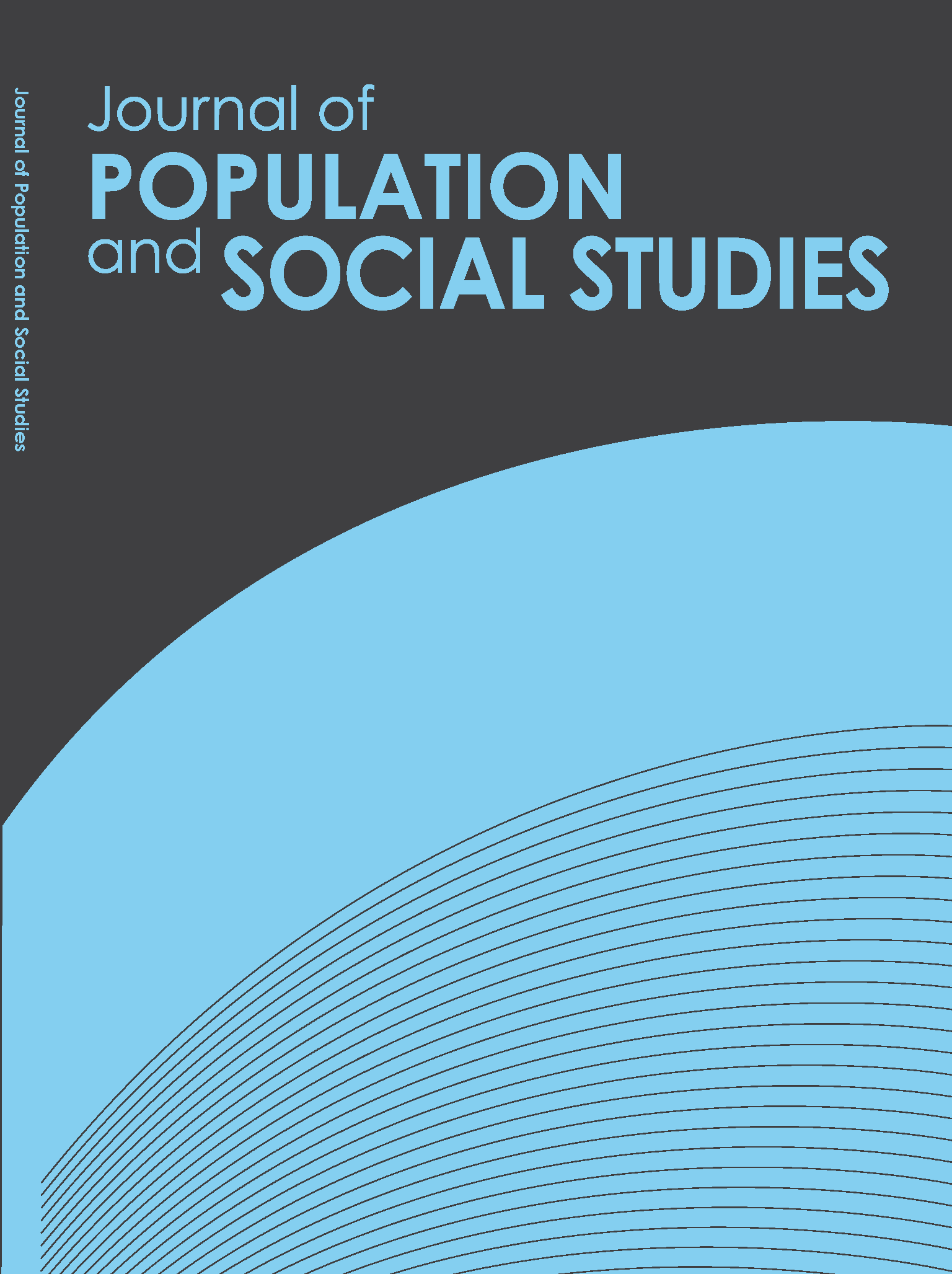Re-securitization as Evasion of Responsibility: A Quantitative Text Analysis of Refugee Crisis in Major Arabic Newspapers
Main Article Content
Abstract
This paper aims to clarify how, and what kind of threat was emphasized by the major Arabic newspapers regarding the refugee crisis in 2015. To address this research focus, I conducted a quantitative text analysis on three levels utilizing 59,423 articles from three Pan-Arab newspapers. The first level was scaling the threat level with Latent Semantic Scaling (a semi-supervised machine learning model); second, classifying threat issues with dictionary analysis; and third, identifying the geographical intensity of each article with Newsmap. Finally, I performed a regression analysis with the combined data to reveal their interrelation. I found that threat framing could differ based on the newspaper, refugee status, timing, issue of the article, and geographical factors. Furthermore, the threat level continued to rise over time and reached the highest point during the crisis period. The Pan-Arab newspapers tended to emphasize threats associated with terrorism and crime, rather than social issues, such as housing, labor, and culture. It was also revealed that when geographical variables were added to the analysis, the newspaper articles were more likely to perceive refugees as a cultural threat if they were predominately associated with the Middle East.
Article Details
References
• Arab Media Outlook 2011-2015: Forecasts and Analysis of Traditional and Digital Media in the Arab World. (2012). Dubai Press Club. https://fas.org/irp/eprint/arabmedia.pdf
• BenEzer, G., & Zetter, R. (2015). Searching for Directions: Conceptual and Methodological Challenges in Researching Refugee Journeys. Journal of Refugee Studies, 28(3), 297-318. https://doi.org/10.1093/jrs/feu022
• Berry, M., Garcia-Blanco, I. & Moore, K. (2016). Press Coverage of the Refugee and Migrant Crisis in the EU: A Content Analysis of Five European Countries. United Nations High Commissioner for Refugees. http://www.unhcr.org/56bb369c9.html.
• Betts, A., & Collier, P. (2017). Refuge: Rethinking Refugee Politics in a Changing World. New York: Oxford University Press.
• Brekke, J-P. & Brochmann, G. (2015). Stuck in Transit: Secondary Migration of Asylum Seekers in Europe, National Differences, and the Dublin Regulation. Journal of Refugee Studies, 28(2), 145-162. https://doi.org/10.1093/jrs/feu028
• Endo, K. (2016). Oushu Fukugou Kiki: Kuno suru EU, Yureru Sekai [Comparex Crisis of Europe: EU in the time of Suffering]. Chuoukoronsha.
• Georgiou, M. & Zaborowski, R. (2017). Media Coverage of the ‘Refugee Crisis’: A Cross-European Perspective. Council of Europe Report. DG1(2017)03. https://edoc.coe.int/en/refugees/7367-media-coverage-of-the-refugee-crisis-a-cross-european-perspective.html
• Glorius, B. (2016). Refugee Migration and Local Demarcations: New Insight into European Localities. Journal of Refugee Studies, 29(4), 429-439. https://doi.org/10.1093/jrs/few041
• Oagino, K. (2017). Vishegrad Guruputo Yoroppa Nannminn Kiki [Visegrád Group and Refugee Crisis in EU: Focusing on Hungarian Reaction]. The Journal of Law & Politics, 67(4), 35-59. https://kwansei.repo.nii.ac.jp/?action=repository_uri&item_id=25417&file_id=22&file_no=1
• Oagino, K. (2018). Oruban Seikento Oushu Nannminn Kiki (2015-2017) [Orban Regime and Refugee Crisis in EU (2015-2017)]. The Journal of Law & Politics, 68(4), 49-70. https://kwansei.repo.nii.ac.jp/?action=repository_uri&item_id=26669&file_id=22&file_no=1
• Hakata, K. (2016). Nannmin Mondai [Refugee Problem]. Chuo Koronsha.
• Hashimoto, N. (2017). Yoroppano Nannmin Mondai [Refugee Problem in EU]. In S. Takizawa, & M. Yamada (Eds.), Nannminwo Shirutameno Kisochishiki [Basic Knowledge for Understanding Refugee] (pp. 206-246). Akashi-shoten.
• Kawaguchi, M. E. (2016). Yoroppakara Minshushugiga Kieru: Nannminn, Tero, Yomigaeru Kokkyo [Disappearance of Democracy in EU: Refugee, Terrorism, and Reintroduction of Territory]. PHP Kenshusho.
• Nakasaka, E. (2016). EU niokeru Nannminntou Ukeireno Sekininnto Futannno Byodou [Partial Responsibility of Acceptance of Refugee in EU: Amendment of Dublin Agreement and Relocation]. Hiroshima Peace Science, 38: 1-14. http://doi.org/10.15027/42939
• Nanba, K. (2017). EUkokkyouchiiki niokeru Kyoukaino Politics [Politics of Transboundary in EU: Construction of Refugee Restriction and Tunisian Refugees]. Japan Border Review, 7, 45-70. http://doi.org/10.14943/jbr.7.45
• Oyama, S. & Takeda, K. (2016). Yoroppaheno Hinannminnno Buntanukeire womeguru Mondai [Problems of Acceptance of Refugee to Europe: Why there were conflicting Policies in EU]. The Review of Economics and Business Management, 43, 17-27. (in Japanese) https://warp.da.ndl.go.jp/info:ndljp/pid/11160031/www.kwansei.ac.jp/i_industrial/attached/0000090963.pdf
• Sadiki, L. (Ed). (2015). Routledge Handbook of the Arab Spring: Rethinking Democratization. London and New York: Routledge.
• Sato, S. (2018). Nannminn Kikigono EU [EU after Refugee Crisis: its Political Impact]. The Japan Institute of International Affairs. http://www2.jiia.or.jp/pdf/research/H30_Europe/01-sato.pdf
• Shami, S. (1996). Transnationalism and Refugee Studies: Rethinking Forced Migration and Identity in the Middle East. Journal of Refugee Studies, 9(1), 3-26 https://doi.org/10.1093/jrs/9.1.3
• Tsuchiya, T. (2017a). EUniokeru Nannminn Kikito Shengenno Saikouchiku [The Refugee Crisis in EU and Reconstruction of Schengen Agreement, No.1]. Journal of Takasaki City University of Economics, 59 (2/3/4), 33-45. http://id.nii.ac.jp/1496/00000855/
• Tsuchiya, T. (2017b). EUniokeru Nannminn Kikito Shengenno Saikouchiku [The Refugee Crisis in EU and Reconstruction of Schengen Agreement, No.2]. Journal of Takasaki City University of Economics, 60 (1), 67-78. https://tcue.repo.nii.ac.jp/?action=pages_view_main&active_action=repository_view_main_item_detail&item_id=896&item_no=1&page_id=13&block_id=21
• Vandevoordt, R. (2017). The Politics of Food and Hospitality: How Syrian Refugees in Belgium Create a Home in Hostile Environments. Journal of Refugee Studies, 30(4), 605-621. https://doi.org/10.1093/jrs/fex017
• Ullah, A. (2014). Refugee Politics in the Middle East and North Africa: Human Rights, Safety, and Identity, New York: Palgrave Macmillan.
• Ward, P. (2014). Refugee Cities: Reflections on the Development and Impact of UHNCR Urban Refugee Policy in the Middle East. Refugee Survey Quarterly, 33(1), 77-93. https://doi.org/10.1093/rsq/hdt024
• Watanabe, K. (2017). Measuring News Bias: Russia’s Official News Agency ITAR-TASS’ Coverage of the Ukraine Crisis. European Journal of Communication, 32(3), 224-241. https://doi.org/10.1177/0267323117695735
• Watanabe, K. (2018). Newsmap: A Semi-Supervised Approach to Geographical News Classification. Digital Journalism, 6(3), 294-309. https://doi.org/10.1080/21670811.2017.1293487
• Yamao, D. (2019). Okuridashikokude Nannminn Kikiha ikani Houdou saretanoka: Arabiago Shuyoshino Ryoteki Tekisutobunsekikara [How was Refugee Crisis reported in the Middle East: Based on a Quantitative Text Analysis of Arabic Newspapers]. Online Paper Series No.10, Working Paper No.6. http://www.shd.chiba-u.jp/glblcrss/online_papers/onlinepaper20191227.pdf (in Japanese)


